
THE BEATLES 1962-1970.

Ah, The Beatles. Everyone knows them. Everyone loves them. To me, they're in my DNA, in the cultural DNA, like oxygen and like food, they're everywhere at all times. What? You haven't heard “Please Please Me”, what? Yes, that's right.
Of course, everyone knows this album, but – viewed from a 52 year gap, is it any good? Well... it's like George Formby. It's a historical artifact at this point, it's a record from another age. The only thing when it was made has in common with know is that we use ears.
It's so innocent. And the sound is so... staid. I'm not expecting any bite as such, from a record made in 1963, but they're all love songs, and they're all at roughly the same tempo, and all roughly the same style. It was – for its time – probably a shocking and important record. But with time, it's an uneven record, made of songs that have become dull by recognition and ubitquous familiarity and others that don't really stick in the mind. Also, and somewha surprisingly, it doesn't resemble an album so much as thirteen songs thrown up in the air, and who have landed in a somewhat random fashion : the last track is the raucous, upbeat “Twist And Shout”. There's no hint that The Beatles will change the world, no hint of what the band would turn into, a collection of thirteen songs – some good, some not so good – that merely just stops with the last song. The Beatles would make better albums.
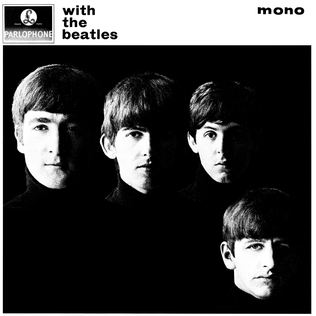
“With The Beatles”. Ah, album two. In some respects, it's just like album one, but with different songs. Only a scant eight months later, this short sharp shock indicates the old world, two sides of vinyl, no more than around 34 minutes in length, 14 songs – none of which are over three minutes. London and the world were full of similar bands, but none were The Beatles. The songs are slower, layered, deeper, but still adrift in youthful exerburance and well, there's no sound of any broken hearts amidst the large number of covers : 6 of the songs are written by others, and whilst this practice was widespread at the time (and concealed the fact the band had written one song a month since the last record), there's few instant classics that are well known here. It would be harsh to call this a contractual obligation, but a rushed and insubstantial record it certainly is, lacking the craft of songwriting they would later reach. It's not an album in the traditional sense, but a collection of songs assembled in an approximate order. It's slightly better than “Please Please Me”, but not godlike genius.
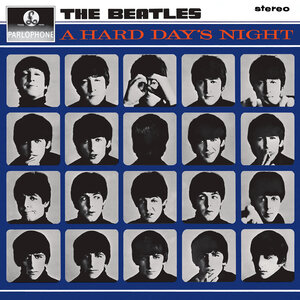
In fact, the opening chord of “A Hard Days Night” appears to be a statement of intent. The band hadn't – up to this point – demonstrated any affection for light and shade, and rock was still n its infancy. It's far more solid than the previous records, though only 30 minutes and 13 seconds long, barely outlives an episode of “Eastenders.” and it's all made of original songs – only the first side of which comes from the film. Given the bands catalogue at the time, the double tracked vocals start to grate – especially on “And I Love Her”, which – and no denying the depth and increasing maturity of the bands skills and sound – has become blunt with time, and overfamiliar. It's a good third album, coupled with a high-churn work rate tha occasionally betrays itself.
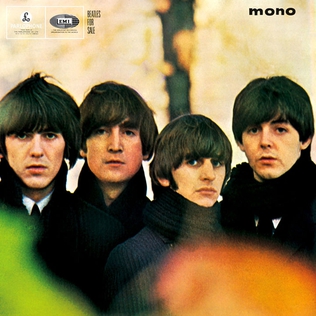
There's a slow progression through the albums : “Beatles For Sale” may very well be a familiar record to most, but to a casual fan, there's just one big hit – in “Eight Days A Week” - and the rest of it is largely unknown. There's some good stuff in here – particularly “Honey Don't” and “No Reply”, but also another 7 covers in the midst of the boys of the album. Once again, nothing on here is longer than 2 minutes and 42 seconds. As is typical of the age, the album closes on an uptempo cover version. I imagine these records were designed to serve as bubblegum pop of the age, as soundtracks for girls talking in bedrooms, and it's only as the band moved along, and were often over in thirty five minutes. It's a step down from the proceeding “A Hard Days Night”, but not a major problem.

“Help” is the fifth Beatles album proper, and yet again – it's a soundtrack – with 5 of The Beatles albums being soundtracks to their films. It's bolstered with two cover versions, including Ringo's singalonga romp of “Act Naturally”. The songs are getting slightly longer, and slightly better, but it's again, a collection of generally mid to fast paced songs about love. “You Like Me Too Much” shines, and there's of course four big hitters in “Help!”, “You've Got To Hide Your Love Away”, “Ticket To Ride”, and “Yesterday”. At last, it seems that The Beatles are becoming the band everyone raves about – it may seem cruel but listened to with modern ears, and no, The Beatles aren't as revolutionary as you might think. They are a band that were of their time, and in this day and age they seem quaint and somewhat dated. Especially when “Yesterday” is followed up with a rampage through an unneccessary, and poorly placed, “Dizzy Miss Lizzy”, which spoils the magic.
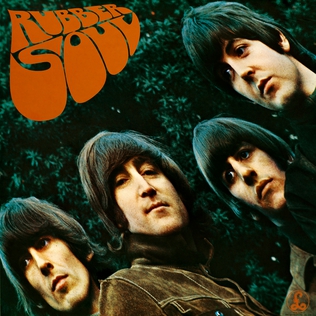
“Rubber Soul” is album six, and here, The Beatles start to change – there's still a clutch of songs, but they all form a coherent whole, as opposed to being an assortment of random material recorded 'on the run' mid tour, as well as being one of the first that contains no cover versions. It may rate as Rolling Stone's fifth best album of all time (they're no kidding : it's good, but it's not that good). Lyrically the album is also much better than before : there's still the usual songs about love, and the somewhat threatening tone of “I'd rather see you dead than with another man”, which sounds like a great pitch for a Beatles Horror Movie, but the songs are about wider things. Now, the band were exhausted by constant touring and work, and there's a clutch of better known songs – the ones thats it within the common kowledge of mankind – alongside perhaps less known songs, so much so, that there are often moments of “Oh! Of course! This one!”. Nonetheless, Rubber Soul is the album where The Beatles started being who we universally recognise as The Beatles, and not as a band of hasty and frantic young men in the eye of a storm. Not the fifth best album ever, but certainly, the best Beatles release so far.

“Revolver” : the first of the 'weird' Beatles albums – Revolver starts off in a generally normally fashion, with the relatively normal “Taxman” - but it's obvious the band are first, phenomally successful, and secondly, moving beyond the previous conventions. “Revolver” adds sitars, pianos, and orchestras, as well as the detuned “Love You To”, the absolutely bananas “Yellow Submarine”, and in “She Said, She Said”, a whole bunch of bizarre studio tricks with what appears to be back-tracked guitars.
“Taxman” is a depressing rant against Her Majesty's Revenue & Customs (anyone who thinks the current UK tax system is oppressive should try “Taxman”'s “1 for you, 19 for me.”), and at last, given that everyone rants and drools about how The Beatles are absolutely the best band in the history of everything, ever. It's only six months after “Rubber Soul”, and in that time, the band have moved forth. It's also fairly obvious that the George Harrison only songs are the ones that are most obviously influenced by non-standard tunings and instrumentation. Horns also make an appearance with “Got To Get You Into My Life” (later, covered live by Oasis on their 1995-96 touring). Whilst they hadn't got to the point of being able to sequence albums with ebb and flow – the album closes with “Tomorrow Never Knows” which could have worked well as an opener, easily setting out the stall that this isn't your old fashioned Beatles anymore.

“Sgt Peppers Lonely Hearts Club Band”. Ah, this is where it starts to happen. The band finally seem to have got the hang of mastering and sequencing : it sounds like an album of songs designed to sit together, and not just a bunch of random stuff thrown together, and the songs, oh, the songs! This is their best one so far. “Getting Better” has a driving rhythm (later appropriated by Frank Turner for his new single “Get Better”), but there's a depth in not so well known songs such as as “Lovely Rita” that betray the fact that basically, stopping touring, and sitting at home doing not very much, is probably the best decision The Beatles could ever have made. The whole thing comes to a close with “A Day In The Life”, which is probably the best Beatles song ever.

“Magical Mystery Tour”. Now we get to the first and most obvious curio in The Beatles body of work. It started off as a double 7” in the UK and, in the tradition of the American market, was reconfigured with a bunch of extra tracks to make a full album. The two co-existed for a decade or so, before the American album configuration was adopted as the preferred version. After all, albums sell more than 7”s. It opens with the under-rated title track, before slipping quickly into “The Fool On The Hill”. The bands quality control isn't always perfect - “Blue Jay Way” is utter b-side material unworthy of being on an album, which perhaps betrays its original status as the end track on a four sided 2 x 7”. The album version follows out the original soundtrack with five 1967 singles, so it's an album that was never intended to be. It sounds good, albeit for probably the worst song released so far in “Blue Jay Way”, and the back half of the albums end on a high note with a run of hit singles that overweight the uneven soundtrack contributions.
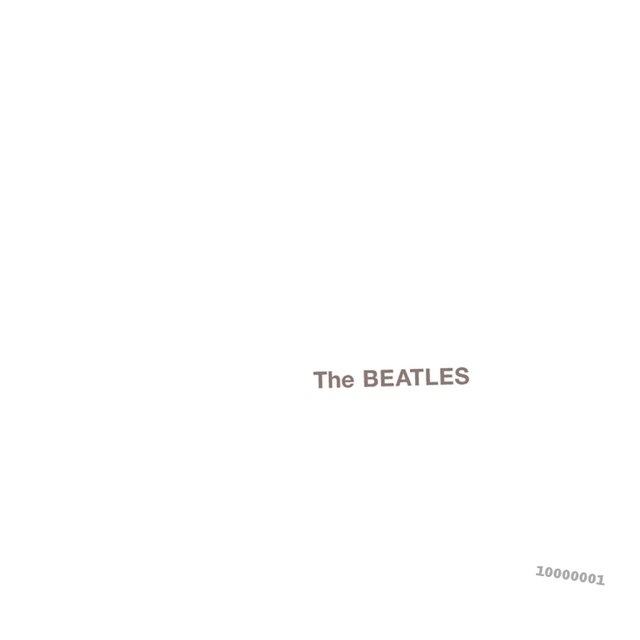
White : Ah, here we go. Another one of the classics. There are so many songs spread over this double set – in the days when a double release was a weighty statement of intent – that it is difficult to pick where and when to highlight. However, the beginning of the fragmentation of the band, the beginning of the end, is here, in both the changes in style and personality, the fact that only half the songs have all four members performing on them, and um, on the risible “Bungalow Bill”, Yoko Ono's tuneless warble enters the mix. Honestly. “Martha My Dear” is a Paul McCartney solo track, and utterly unexceptional. The whole record is the sound of four egos fighting for supremacy, and all coming away bruised. And a song like “Rocky Raccoon” is meaningless and trivial : the sound that the band have previously used as a trademark, that is, a sense that every song on the record has to be there and the songs are fighting for space and inclusion, as well as an urgency, is missing. It's the sound of the band sounding... not always bothered about their choices. To me, were this the first Beatles record I heard, I would wonder what the point of the band was. Over time, it becomes more.... exhausting in the esoteric difference between each song, the wild pitches in mood, and the utterly trivial of songs like “Sexy Sadie” and “Honey Pie” that are very British whimsy. The distinctive personalities of Starr, Harrison, McCartney, and Lennon come out and start tearing the record apart – there's little sense of a group, but more four solo bands made of the same members, each of whom has a distinct leader. And there's “Helter Skelter”, which even though buried on Side Three is the best song on the second slab. “Revolution No.9” is well, probably groundbreaking studio experimentation, but looked at from a forty five year distance, b-side fodder that most bands would place in their rejects folder. “Good Night” however is a sweet and appropriate closing song, adding a weight and gravitas that the rest of the record seems to have generally neglected with a disparate and fragmented selection of diverse personalities that sadly don't hang together as a cohesive whole, but sounds like the work of four seperate bands made of the same musicians.

Yellow Submarine : Well, this is a curio. A quickly assembled hotchpotch of songs made for the um, less than wonderful film of the same name, it recycles two previous released tracks, four new ones, some of them random leftovers from previous sessions, including - “Only A Northern Song”, “All Together Now”, Hey Bulldog”, and “It's All Too Much” - and, if you have the original issue, a side of George Martin orchestral tracks. The 1999 “Songtrack” version pads the release out with a seemingly random selection of material the band had previously issued, which makes it for a odd semi-Best-Of. By all means, it's OK, but nowhere the best record The Beatles ever released.

Let It Be. This is a lot more like it. The fragmented and divided “Four Solo Albums” feel of The White Album is rubbished utterly with the sound of four guys in a room, making a racket. Much better than both the torturous sessions that made it, the Phil Spector production, and its reputation, it's a solid and strong record. And “Across The Universe” is one of the finest love songs ever written.
Spectors production – ceaseless overdubs – does intrude, specifically on “I, Me, Mine”. On other songs, such as “Dig It”, it captures the rare air of a band again, working. I would hesitate to call it a return to form, but it's much better, and more cohesive than the White album. And some of the songs – such as “Let It Be”, “The Long And Winding Road”, and “Get Back” are simply effortlessly perfect. It's the sound of the band gluing itself back together and – even though the band is, at this point, near the end, at last they come together as a solid unit when they play music. It may not always have been true, but the music can fool you, and this sounds like the band that everyone tells me The Beatles were. A good one.

Abbey Road.
Here's another record that everyone says is fantastic and perfect. But it has “Maxwell's Silver Hammer” on, so it's one of the worst records ever made. In fact, aside from the opening of “Come Together” and “Something”, it's a generally underwhelming record. At this point have to admit that maybe The Beatles aren't the greatest band ever, and not one of my favourites. I tried, oh, I tried, to listen to all the albums... and they seem quite good, and often – for the time – revolutionary, but nowadays, maybe not so much. And “Octopus's Garden” is, like many of the bands later songs, a entertaining piece of whimsy, but the sound of insulated millionaires indulging their own self-contained universe. By this point though, The Stones, Pink Floyd, and The Doors – to name but a few – were already well into their journey, and The Beatles were just another very good band ; not the cure for cancer, not the best thing that ever happened, not the be-all and end-all of music, but just a band, and sometimes a very good one.

Aside from the 1962-66 and 1967-1970 compilations, “Past Masters” is the first of The Beatles albums that indicates the band is finished as an entity : in compiling in one chronological session their official non-album releases, it's the nearest thing the band ever got to a 'b-sides album' (and the first major Beatles release after Lennon's premature death). As an alternate history of the band, it follows them in order from their early days, with barely distinguishable different versions of early singles, as well as occasional, less than amazing track. There's an element of greatest hits in here, given the minor differences, with twelve A-sides across the 33 songs and, with most of the two discs made up with material from the first half of their career, it's heavily toploaded towards their most friendly, cuddly, MopTop Blokes in Suits years. And then you get to “The Inner Light” and all of a sudden, The Beatles go weird. The whole thing ends on the tedious in the studio noodling of “You Know My Name (Look Up The Number)”. It's more of a Beatles Appendix, a set of leftovers that never had a proper home, and obvously not an actual album.
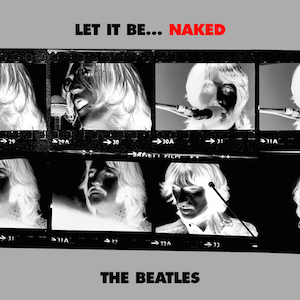
Let It Be.... Naked
Released thirty five years after the original sessions, “Naked” sees the most miserable Beatles record (to make anyway) reinvigorated. To the unitiated it's a different, but equally valid record – I would hesitate to say better or worse than the original – and one which has a different feel. The album is resequenced, the orchestral backing and overdubs removed, and different takes of the songs. All this came from some provisional work into remixing and remastering the long-out-of-print “Let It Be” film, which has been unavailable now for well over 20 years. Its more an interesting exercise in historical revisionism, by seeing an alternate version of an existing record, not a new Beatles record by any stretch of the imagination. It's the kind of stuff that would make an interesting 'bonus disc' on one of the indeterminable legacy reissue box sets, not an album in its own right. It's still the same record, just presented in a different frame, thankfully shorn of some of the more overblown Spectorisms, and with some new, unheard – but hardly revelatory performances.
It begs the question, when, or if, the now-abandoned “Get Back” album, or the “Let It Be” film will be made available again. Then again, given the bands propensity to think about something new every Christmas, well, there are many Christmases ahead, and many old things yet to be repackaged and issued on DVD, Blu-Ray, CD, and LP.
